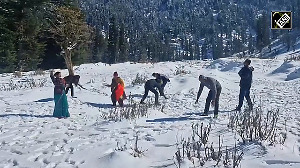With China developing its military capabilities in outer space and doing a global search for resources, India has said its neighbour posed new strategic and geopolitical challenges, forcing it to look for more sophisticated ways to deal with the Asian giant.
"We (India) would need to develop more sophisticated ways of dealing with these new challenges (strategic and geopolitical) posed by China. We are today faced with a new China," External Affairs Minister Pranab Mukherjee told the National Defence College in New Delhi on Monday.
"Today's China seeks to further its interests more aggressively than in the past, thanks to the phenomenal increase of its capacities after thirty years of reforms," Mukherjee said, delivering a lecture on 'India's Security Challenges and Foreign Policy Imperatives'.
There were also new set of challenges which China posed, 'such as the strategic challenge as China develops its capabilities in outer space; the geopolitical challenge as it reaches out to various parts of the globe in search of raw materials and resources,' he added.
Noting that relationship between India and China is 'somewhat normalised', the minister said there still existed 'some unresolved issues' between the two countries.
"However, we need to factor in the fact that as a result of our engagement we have today a completely different situation than when we started. Further, the economic developments in the period had given both countries new capabilities," he added.
Stating that China, as the largest neighbour and as an emerging power, was 'both a challenge and a priority', Mukherjee said, "We cannot change our neighbours. It is important therefore for us to recognise and work with the reality."
Pointing out that coping with its rise was the first of the three immediate challenges faced by India, he said India believed there was sufficient space for both countries to grow together and build a cooperative relationship in the new (global) architecture.
The second challenge, Mukherjee said, was maintaining peaceful periphery around India.
"We need to ensure a peaceful periphery and an environment of peace and stability in our region and in the world, which will facilitate maintenance of socio-economic development and safeguarding our national security," he said.
India was already engaged in establishing strategic partnerships and expanding the scope and depth of economic and strategic interaction with different countries, groupings and regions, whether long-standing partner Russia, South East Asia, Japan, Central Asia or India-Brazil-South Africa, he said.
Listing terrorism, "which emanates from our neighbourhood", as the biggest threat to peace and security in the region, Mukherjee said the issue was compounded by danger posed by terrorists' accessing weapons of mass destruction or related technologies.
"The series of attacks in Pakistan shows the fragile internal situation of that country, a situation we continue to monitor closely and which we hope will not deteriorate. The situation in Afghanistan remains (a) grave concern and a resurgent Taliban poses a threat beyond Afghanistan," he said.
"Our (India's) challenge has been (to) try and work with both countries, to stabilise the situation," Mukherjee said.
With Pakistan, India had called for removing bilateral impediments to trade and economic relations, which should not be predicated on resolving contentious political issues, he said, noting that some progress had been achieved in this regard, notable along the line of control (LOC).
"We are, however, continuing to persuade Pakistan to grant overland transit to our goods, as this can speed up stabilisation in Afghanistan. We believe this can also lead to greater commerce and benefit all the countries in the region," he added.
Stating that India's goal was 'a peaceful, stable and prosperous neighbourhood', the minister said the nation's economic growth was providing increased opportunities for other countries in the region through partnerships.
"The challenge will, however, be to persuade our neighbours to set aside past mistrust and suspicions, which have undermined development of harmonious relations and restricted the space for expression of our natural sentiments of affinity, based on a shared history," he said.
India continued to put forward proposals, multilaterally through the SAARC and bilaterally, to its neighbours, by making unilateral gestures and extending economic concessions.
"The facility of extending duty free access to imports from Bangladesh, Nepal, Bhutan and Sri Lanka demonstrates India's readiness to assume asymmetric responsibilities," he added.
Referring to his recent visit to Iran, which met India's sizable portion of energy needs, Mukherjee said on the nuclear issue, "We have conveyed that Iran must fulfill all its international commitments including those it has undertaken under the NPT."
Stating that the third challenge was managing relations with major global powers, particularly in the wake of its growing engagement of the US, the External Affairs Minister said India needed to use its strengths to create partnerships in a manner, which would allow it political and economic space to grow.
"Over the last few years our relations with all major powers have substantially strengthened. Our relations with the US are now completely transformed and this is reflected in the successful completion of the civil nuclear initiative," he added.
India has also strengthened partnership with EU, apart from traditional relations with Russia, and Japan.
"As we look forward to an increasing role in global affairs, we need to expand our network of international relationships, political engagement, and economic and technical cooperation with the world. We are working with major powers in forums such as US, G8, East Asia Summit, ASEAN Regional Forum, RIC and IBSA," the minister said.
"Multi-polar engagements allow us to contribute actively to the search for solutions to issues such as regional and international security, terrorism, climate change, economic growth and energy," he added.
To illustrate the changes in global order, Mukherjee said the NSG waiver for nuclear trade in September was a vindication of India's policies, non-proliferation record, and refusal to compromise on well-established policy, allowing it to contribute to global nuclear cooperation.






 © 2025
© 2025